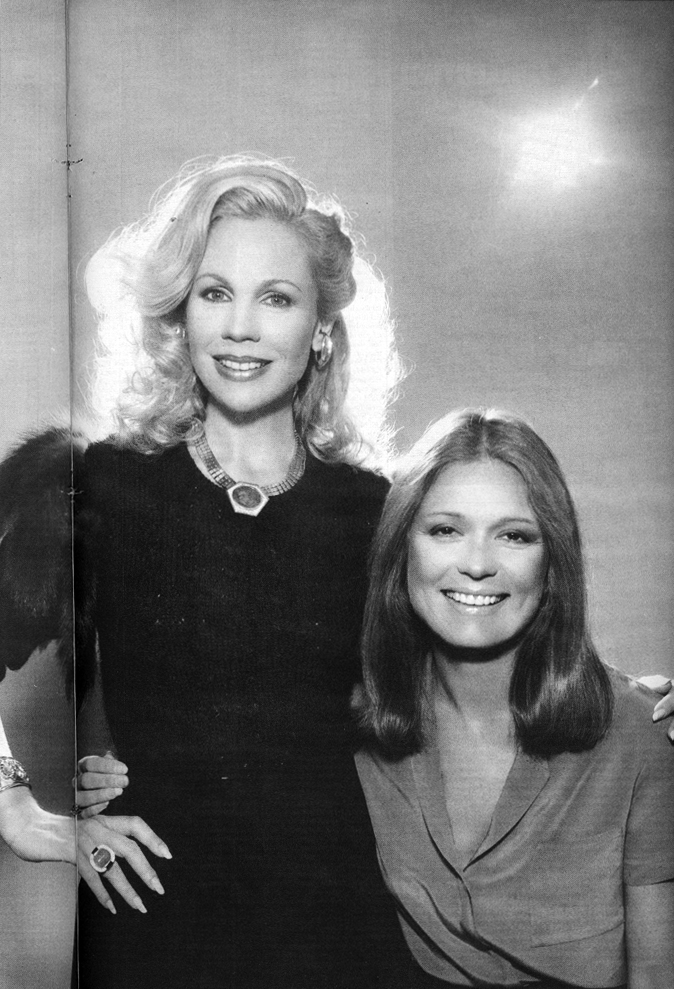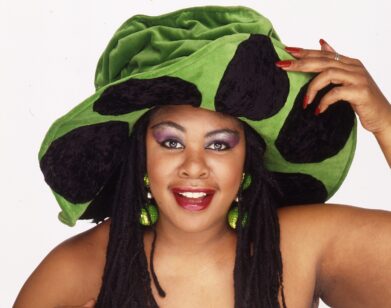New Again: Gloria Steinem

Today, in honor of International Women’s Day and “A Day Without A Woman,” women around the world strike and show solidarity for one another through protests large and small—by taking off of work, marching in the streets, wearing red, purchasing consciously, and more. The demonstration follows January’s many Women’s Marches, and according to its organizers serves to “[recognize] the enormous value that women of all backgrounds add to our socio-economic system—while receiving lower wages and experiencing greater inequities, vulnerability to discrimination, sexual harassment, and job insecurity.”
To honor this continuing, passionate fight for women’s rights, we’re revisiting an interview from the May 1984 issue of Interview where Gloria Steinem, an iconic face of the feminist movement, speaks to philanthropist Carolyn Farb about her fellow feminists, personal life, and the publications she started that have affected the lives of women across the country. —Katrina Alonso
Gloria Steinem
by Carolyn Farb
Her name alone carries with it the weight of conviction. In the 20 years since her writing first appeared in this country, Gloria Steinem has come to personify the crucial political demand on all those, male or female, with humanist sympathies. Like her 19th-century foremother Susan B. Anthony (a Republican, unlike Steinem), she has challenged the male establishment at every turn of her public career. After graduating from Smith College and spending two years studying and writing in India, Steinem returned to New York as a journalist and helped start several magazines, among them New York (for which she was a political columnist until 1971) and Ms., the only national publication of original material edited and controlled by women. Instrumental in founding the National Women’s Political Caucus, the Coalition of Labor Union Women and Voters for Choice, Steinem worked in the campaigns of Cesar Chavez’s United Farm Workers, Shirley Chisholm, John and Robert Kennedy, George McGovern and Bella Abzug. Named one of the 25 Most Influential Women in America for the sixth consecutive year in 1983, Steinem shares the current social activist award with Coretta Scott King. “Influential is a good word,” says Steinem, “it says that we have the power to persuade…”
Recently, Holt, Rinehart and Winston published Gloria Steinem’s first book-length collection of essays under the title “Outrageous Acts and Everyday Rebellions.” Beginning with the author’s famous essay concerning her brief, but enlightening hop as a Playboy bunny, the book includes political portraits (Eugene McCarthy, Nelson Rockefeller, Richard Nixon, George McGovern), personal portraits (Alice Walker, Pat Nixon, Marilyn Monroe, Jacqueline Onassis, Linda Lovelace) and a final section of potent political commentary. “There is no subject that feminism doesn’t transform,” Steinem has said. Coming from her, this point can hardly be Ms.-taken.
CAROLYN FARB: Name four women who did the most to popularize the women’s movement.
GLORIA STEINEM: That’s difficult because they must be women who are in or who have access to the media. In some ways, people who have an idea and whose name you don’t know have done just as much. But from the point of view of being well-known and also giving the message to women, I suppose Simone de Beauvoir’s book [The Second Sex] in the ’60s really has been an enduring pillar of consciousness. Robin Morgan’s book, Sisterhood is Powerful, is very important because it has essays from lots of different women in different situations. So every woman who [read] it has probably found something there and that just continues to sell like a sort of steady staple. So even though I think Robin is only moderately well-known, I think having produced that book—
FARB: What is she doing now?
STEINEM: She’s just done the same thing on an international level with essays from women from different countries.
FARB: Shirley Chisholm?
STEINEM: Shirley Chisholm should have. The problem is that the country is still so racist—I guess it’s hard to find another word for it—that they still, the press in general and many people, perceive only white women as feminists. They think black women are black. There’s a wonderful title of a black feminist anthology which is, All the Men Were Black, All the Women Were White, But Some of Us Were Brave. l think she was more perceived as being a civil rights and a black activist than a feminist even though she always said it had been more difficult for her in political life because she was a woman than because she was black.
FARB: Betty Friedan?
STEINEM: Betty Friedan’s book [The Feminine Mystique] really did a lot for women who were married and living in the suburbs and had an education they were not using and wanted to use, that they had a right to have a profession and so on. But the problem to me with her book was that it was reformist, not feminist. That is, it was talking about some women, it was talking about well-educated, suburban, white women. It wasn’t talking about all women. And that was very important to that category of women. For instance, I read it and it didn’t have any meaning for me because I was already in the work force. I was working as a journalist and living in New York and experiencing all the kinds of things that women experience, and the book didn’t speak to that. The book seemed to say. “Women have a right to be where you are.” I said. “That’s fine, but how come I’m having such a bad time anyway even though I’m not in the suburbs and even though I’m not married?” But that doesn’t mean it didn’t help a particular group of women very much.
FARB: If you had to name one person who was responsible for the Equal Rights Amendment and its failure to pass, who would it be?
STEINEM: I don’t think it’s any one person. Phyllis Schlafly, to my knowledge, never persuaded any single legislator to change his vote. She was a sort of symbol: she was the only nationally known woman who was against the Equal Rights Amendment. So the legislators who were against it anyway would call her in to speak.
FARB: Have you ever debated her?
STEINEM: No, on principle, I wouldn’t debate her. We sort of came to a fairly standard political agreement inside the group of women leaders that those women who were better known than she shouldn’t debate her because it would only increase her audience. So … other women debated her—
FARB: Those who would not fan her movement?
STEINEM: Right. Which is a sort of standard political decision. If you’re the front runner, you don’t debate … But I don’t like debates anyway. I have never debated anyone, I think they’re a very masculine form—like an intellectual prizefight. They let you know who the better debater is but they don’t really tell you about the issue. It’s all heat, but no light.
FARB: You are one or the founders of Ms. magazine. How did you conceive it?
STEINEM: We started it in 1972 by doing a test issue which sold out. That was an enormous success and enabled us to start regular publication in July of ’72. When I say the test issue was an enormous success, I should precede that by saying we spent a year walking around the streets of New York, trying to persuade people to invest in this idea. But the thought of having a magazine that is controlled by women—I mean, there still is no other such magazine controlled by its staff—and a feminist magazine, was not viewed as possible. Starting a magazine is hard no matter what kind of magazine it is and we just couldn’t raise any money. If it hadn’t been for the success of the test issue, the money for which came from New York magazine, where I had been working, so that there was proof that readers wanted it … I mean, this issue was supposed to be on the newsstands for three months and it sold out in eight days.
FARB: So you found there was a market for your product.
STEINEM: Absolutely. But not one expert in the magazine business thought there was-not one.
FARB: Wasn’t Katherine Graham of the Washington Post supportive of Ms.?
STEINEM: Yes, she was. At the stage of our having done a dummy for the magazine and listing the writers and editors and trying to raise money, which we were doing totally on our own, she gave us $20,000 for expenses. That was really the first gesture of faith by anyone.
FARB: Did you think of Ms. as a political or commercial venture, or as a voice for your own beliefs?
STEINEM: It is a magazine that takes for granted that women are full human beings and goes on from there. Other magazines are still arguing about it. They publish one article saying women are equal and one next to it saying they’re not, in order to be “objective.”
FARB: Were your good looks an asset or a liability?
STEINEM: I don’t remember being thought of as good-looking until I became a feminist. It’s more of a comment on people’s expectations than of what a feminist would look like. They assumed that if you could get a man, you wouldn’t want anything else—what else could you possibly want? So that feminists who were talking about such things as equal pay must be doing so because they were unable to get a husband to support them, and therefore they must be ugly—this was the sort of train of thought. It’s not extinct, but it’s changing. So because I looked different from the stereotype, then people would comment. Before that, it was almost entirely a liability as a writer. I remember being sent home … My literary agent had sent me for an assignment to Life magazine. I walked into the office, and the editor looked up from his desk and said, “We don’t want a pretty girl, we want a writer. Get out of here.” That was that. It made you a novelty, sort of like a talking dog—a pretty girl who thinks. But in a deeper sense, it was a liability because they didn’t take you seriously.
FARB: So it’s made you the exception in certain situations—like the only girl on the team in certain assignments?
STEINEM: I would have been that anyway.
FARB: When you were a youngster I understand you were quite a hoofer. Do you still like to tap dance?
STEINEM: I really like to tap dance. I think it’s great fun.
FARB: Where do you do it now?
STEINEM: Mostly in elevators, when there’s nobody in there but me and the muzak. Then the doors open and there I am, arms akimbo, caught embarrassingly in mid-step. But sometimes, when I work at home and I’m tired of sitting at the typewriter, I’ll get up and tap dance.
FARB: Which presidential candidate do you think is the most receptive to women’s issues?
STEINEM: Well, all of them, except for Ronald Reagan, are receptive, at least on paper. By all of them, I mean on both sides—Senator Bob Packwood, for instance, who had spoken up as a presidential possibility if Reagan chose not to run, is also much better on women’s issues. Most politicians outside the right-wing extremists, like Reagan, have become fairly responsive. Only one of the Democratic candidates, I would say, is not acceptable, and that is Reuben Askew.
FARB: Will you endorse a candidate?
STEINEM: I will certainly work for any candidate running against Ronald Reagan. If Ronald Reagan comes to office completely unimpeded by the prospect of reelection and he proceeds with his agenda of the human life amendment, for example, which would criminalize abortion, it would mean that one in four women in this country would be subject to imprisonment. One in four women has an abortion. No country in the world has this measure, and he wants it. Very few countries don’t have some kind of guarantee of equality in their constitutions, and he won’t support that. There’s a wonderful cartoon of Reagan in a Western hat and he’s saying, “A pregnant woman in every home, a gun in every holster. Make America a man again.” That sums up his attitudes: pro-military, anti-equality, pro-rich, anti-poor.
FARB: In 1972 you endorsed George McGovern. Are you still in contact with him?
STEINEM: Sort of. He sends me his speeches from time to time, but I haven’t actually seen him for a couple of years.
FARB: How did you change his image when you were in contact with him?
STEINEM: The work I did for him, as it was reported by the press, was that I told him when he was on television to stop wearing short socks. You know how men cross their legs on television and suddenly there’s this hairy leg. Actually, I raised most of the money for his ’68 campaign, I wrote speeches, I traveled, I was his advance person—but the press only picked up on the socks because the press only thinks that women know about socks. It seemed like I was his fashion coordinator, which always made me mad.
FARB: You were in Texas at a fundraiser for The Stars of Texas Gala for the Ms. Foundation. You mentioned a female prisoner. You seem to get a lot of gratification from such success stories.
STEINEM: Oh yes, it means so much when people come up and tell you what’s happened to their lives.
FARB: She wasn’t able to get law books because they only had law books for the male prisoners?
STEINEM: She was in jail in Michigan for prostitution and she got Ms. material … I don’t know what. Perhaps she came in contact with one of our foundation projects. She said she began to wonder for the first time why her customers were not in jail and why her pimp was not in jail. So she asked for law books and was told that women’s prisons didn’t have law books—only men’s prisons. So she organized the prisoners, got law books, read the law and became the jailhouse lawyer for the other women. She got out and went to be an apprentice in a women’s law firm and went to law school at night and now she’s a lawyer.
FARB: Does your life style enable you to have close friends?
STEINEM: It makes it much easier to have close friends than it was pre-feminism or before conscious feminism. First of all, I’m working with people who share the same values. We’re very diverse people but we share a kind of fundamental belief that women and men are equal human beings, and that means we’re friends in a way that people who work together in corporate settings or factory settings don’t have a chance to be. I can’t tell the difference between my work life and my private life—it’s all the same to me. The other reason I think friendship is easier now, especially with men, is because I can tell the truth now instead of giggling and Uncle Tomming and saying, “How clever of you to know what day it is” like we used to.
FARB: Do you live alone?
STEINEM: Yes, I live in a brownstone in New York in the East Seventies. Right now there’s a woman who is a film director, a wonderful, courageous woman from Egypt who stays with me when she’s in town. There are lots of people coming in and out of the apartment. And I have a male friend whom I have been seeing for nine years—I think it’s my Olympic record. He used to live in Washington because he was in the civil rights division of the Justice Department, but now he lives in New York just a few blocks from me. Everything is individual choice but, for me, it’s the perfect combination. I need to have privacy some of the time. I can’t quite imagine sharing an apartment permanently with anyone.
FARB: Was your mother an unknown source of strength?
STEINEM: Well, she’s turned out to be an unknown source of understanding that I still rely on—not of strength because she was not a strong person. She was a strong person whose spirit was broken.
FARB: Do you feel that you would not be the person you are today had it not been for living through your experiences with her?
STEINEM: I’m not sure of that. I think we spend a lot of time denying our mothers. We understand other women earlier than we understand our mothers because we’re trying so hard to say, “I’m not going to be like my mother” that we blame her for her condition. If we didn’t blame her for her condition, we would have to admit that it could happen to us, too. I spent a long time doing that, thinking that my mother’s problems were uniquely her fault. I’m not saying that all women are blameless—all women are not. There are women with despicable characters who are cruel and terrible and some of them are mothers. But why do we blame our mothers more than our fathers? We let our fathers get away scot-free. We hardly even knew who they were in many cases, given the way this culture raises kids, and they may have been quite cruel. They may even have raped us as children, but even if they raped us, we will blame our mothers for not protecting us instead of blaming our fathers who actually did it.
THIS INTERVIEW ORIGINALLY APPEARED IN THE MAY 1984 ISSUE OF INTERVIEW.
For more from our archives, click here.






